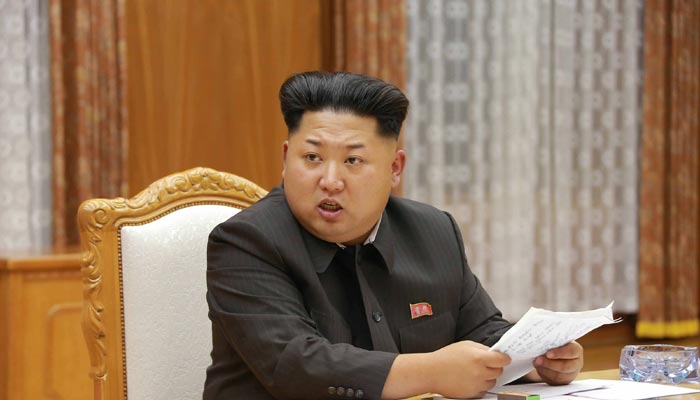Kim Jong-Un attends an emergency meeting of the Workers' Party of Korea Central Military Commission at undisclosed place in North Korea on Thursday.
* North Korea demands South halt broadcasts by 5 pm on Saturday
* South: broadcasts to continue, expects attack on some speakers
* Daily life goes on as normal in Pyongyang, Seoul
Reuters/Seoul
North Korean leader Kim Jong Un ordered his troops onto a war footing from 5 pm on Friday after his government issued an ultimatum to Seoul to halt anti-Pyongyang propaganda broadcasts by Saturday afternoon or face military action.
South Korean Vice Defence Minister Baek Seung-joo said it was likely the North would fire at some of the 11 sites where the loudspeakers are set up on the South's side of the Demilitarised Zone (DMZ), which separates the two countries.
Tension escalated on Thursday when North Korea fired shells into South Korea to protest against the broadcasts. The South responded with its own artillery barrage. Both sides said there were no casualties or damage in their territory.
The North's shelling came after it had demanded last weekend that South Korea end the broadcasts or face military action - a relatively rare case of it following up on its frequent threats against the South.
Landmine explosions
Its 48-hour ultimatum to halt the broadcasts, delivered in a letter to the South Korean Defence Ministry via a joint military communications channel, was also uncharacteristically specific. The deadline is around 5 pm (0800 GMT) on Saturday in Seoul.
Baek told parliament the broadcasts would continue unless the North accepted responsibility and apologised for recent landmine explosions that wounded two South Korean soldiers along the DMZ. Pyongyang has denied it was responsible.
"There is a high possibility that North Korea will attack loudspeaker facilities," Baek said.
In the North, Kim would put his troops on a "fully armed state of war" starting from 5 pm and had declared a "quasi-state of war" in frontline areas, Pyongyang's official KCNA news agency reported.
There were indications the North was preparing to fire short-range missiles, the South's Yonhap news agency said, citing an unnamed government source. The North often fires rockets into the sea during annual US-South Korean military exercises, which are currently under way.
Pyongyang's declaration of a semi-state of war was its first use of such terminology since the North shelled a South Korean island in 2010, Yonhap said. Two South Korean marines and two civilians were killed in that incident, which followed another ultimatum delivered by the North.
The precise nature of the latest ultimatum was a bit unusual, said John Delury, a North Korea expert at Yonsei University in Seoul.
"North Korea is a constant font of generalised threats, but putting a time stamp on it is a little bit different. It puts both Seoul and Pyongyang's necks on the chopping board. Someone has to blink here," he said.
Currency, shares fall
South Korea's won currency and shares fell as the heightened tensions added volatility to markets already hit by concerns about the global economy.
The US military, which has 28,500 personnel based in South Korea, said it was closely monitoring the situation.
Washington earlier urged Pyongyang to halt any "provocative" actions in the wake of Thursday's exchange of fire, the first between the two Koreas since last October. Japan called on North Korea to exercise restraint.
Despite the tensions, life went on as normal in both capitals.
"People are going about their business completely as usual," Morten Traavik, a Norwegian who organised a two-show visit to Pyongyang by Slovenian avant-garde rock band Laibach, said from the North Korean capital.
"There have of course been news bulletins on North Korean television announcing the North Korean military's pretty bombastic statements," he said by phone.
Fishing was suspended around three South Korean islands off the west coast, the coastguard said. Most of the nearly 800 South Koreans ordered to leave their dwellings near the border on Thursday had returned home, although one village remained evacuated, local officials said.
South Korea limited entry into an industrial park it runs jointly with North Korea near the border, but the complex, seen as a barometer for the state of inter-Korean relations, continued to operate.
The renewed hostility is a further blow to South Korean President Park Geun-hye's efforts to improve North-South ties, which have been virtually frozen since the deadly 2010 sinking of a South Korean navy ship, which Seoul blames on Pyongyang.
Seoul began blasting anti-North Korean propaganda from loudspeakers on the border on August 10, resuming a tactic that both sides had stopped in 2004, after the landmine explosions.
North Korea on Monday began conducting its own broadcasts.

